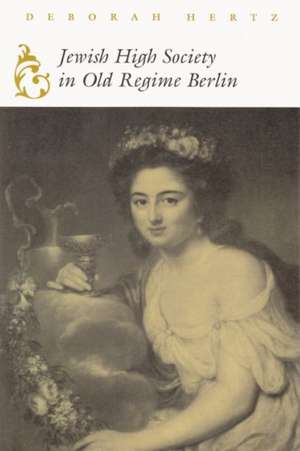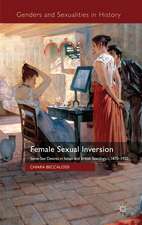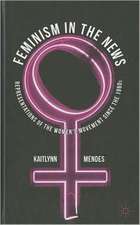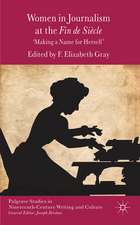Jewish High Society in Old Regime Berlin: Modern Jewish History
Autor Deborah Hertzen Limba Engleză Paperback – 31 mai 2005
| Toate formatele și edițiile | Preț | Express |
|---|---|---|
| Paperback (1) | 201.97 lei 3-5 săpt. | |
| Syracuse University Press – 31 mai 2005 | 201.97 lei 3-5 săpt. | |
| Hardback (1) | 424.99 lei 6-8 săpt. | |
| Yale University Press – 27 apr 1988 | 424.99 lei 6-8 săpt. |
Din seria Modern Jewish History
-
 Preț: 209.49 lei
Preț: 209.49 lei -
 Preț: 231.55 lei
Preț: 231.55 lei -
 Preț: 230.08 lei
Preț: 230.08 lei -
 Preț: 297.20 lei
Preț: 297.20 lei -
 Preț: 131.54 lei
Preț: 131.54 lei -
 Preț: 285.27 lei
Preț: 285.27 lei -
 Preț: 161.96 lei
Preț: 161.96 lei -
 Preț: 169.28 lei
Preț: 169.28 lei -
 Preț: 240.89 lei
Preț: 240.89 lei -
 Preț: 251.82 lei
Preț: 251.82 lei -
 Preț: 114.52 lei
Preț: 114.52 lei -
 Preț: 206.89 lei
Preț: 206.89 lei -
 Preț: 248.78 lei
Preț: 248.78 lei -
 Preț: 135.20 lei
Preț: 135.20 lei -
 Preț: 153.22 lei
Preț: 153.22 lei -
 Preț: 207.48 lei
Preț: 207.48 lei -
 Preț: 231.26 lei
Preț: 231.26 lei -
 Preț: 235.60 lei
Preț: 235.60 lei -
 Preț: 411.08 lei
Preț: 411.08 lei -
 Preț: 225.91 lei
Preț: 225.91 lei - 20%
 Preț: 231.42 lei
Preț: 231.42 lei
Preț: 201.97 lei
Nou
Puncte Express: 303
Preț estimativ în valută:
38.65€ • 40.37$ • 32.05£
38.65€ • 40.37$ • 32.05£
Carte disponibilă
Livrare economică 21 ianuarie-04 februarie 25
Preluare comenzi: 021 569.72.76
Specificații
ISBN-13: 9780815629559
ISBN-10: 0815629559
Pagini: 299
Dimensiuni: 162 x 241 x 24 mm
Greutate: 0.5 kg
Ediția:Syracuse Univ P.
Editura: Syracuse University Press
Seriile Modern Jewish History, Modern Jewish History
ISBN-10: 0815629559
Pagini: 299
Dimensiuni: 162 x 241 x 24 mm
Greutate: 0.5 kg
Ediția:Syracuse Univ P.
Editura: Syracuse University Press
Seriile Modern Jewish History, Modern Jewish History
Notă biografică
Deborah Hertz is Professor of European history and Herman Wouk Chair in Modern Jewish Studies, University of California at San Diego.
Recenzii
"A rich, sophisticated, and original social history. It contributes to our knowledge and understanding of German history in a period whose social aspects have long been neglected by scholars. It also makes a significant contribution to Jewish history and to women’s history."—Mary Nolan, New York University
"This impressive study tells us much that is interesting about the salons, while illuminating the whole period of which they were a part."—Gordon A. Craig, New York Review of Books
"An interesting and amusing book about this era."—Alexander Zvielli, Jerusalem Post
"An enlivening study of the era of the "Enlightenment" when in Germany, Jewish cultural emancipation was proceeding apace despite continuing legal and social humiliations. . . . The scholarly apparatus and studious analysis of material is . . . fascinating."—Stephen Massil, Jewish Book News and Review
"For the first time a serious attempt is made to ascertain precisely why the salons came to exist at this time; why in Berlin; who frequented them; and for what reasons."—Lionel Kochan, Journal of Jewish Studies
"Engaging, intelligently written. . . . The focus of her interest is the nine Jewish women who presided over salons, whose lives she has painstakingly reconstructed. . . . Hertz appears to be in full command of the dimensions of the salon phenomenon, including the social bases of intellectual life, the economic problems of the Prussian nobility, Berlin’s urban history, and the position of Berlin Jews. . . . The author has provided us a fine study of a limited subject which, fully and suggestively explored, illuminates the broad field around it."—Lloyd P. Gartner, Journal of Modern History
"Hertz has written an interesting book on a subject all too frequently overlooked by historians. . . . This book is a welcome addition to what is still an under-researched period, Germany in the late eighteenth and early nineteenth centuries."—Marilyn Shevin Coetzee, The Historian
"Scholars will welcome this book as a model of the new social history. But college students and college-educated general readers will find the book attractive as well; if they prefer to avoid the charts and statistics, they can be charmed by the descriptions of the intellectual, personal, and sometimes amorous relationships in the salons themselves."—Gordon R. Mork, History
"The book represents an important contribution on a subject that possesses intrinsic interest to student of both history and literature. It goes beyond its predecessors."—Choice
"Here is an outstanding work of cultural history which brings an inexplicably neglected subject into sharp and vivid focus. . . . Crisply and readably written . . . a major contribution, not only to women’s studies, but to the sociology of the Enlightenment."—Ritchie Robertson, German History
"An enlivening study of the era of the ’Enlightenment’ when in Germany, Jewish cultural emancipation was proceeding apace despite continuing legal and social humiliations. . . . Its special appeal is to cover a neglected area of women’s emancipation, that has been both regretted and admired, since the role the salonieres carved out for themselves, was so precarious and transitory. . . . It brings to the fore the neglected social history of an otherwise well-charted period."—Stephen Massil, Jewish Book News and Reviews
"This is a lively and engaging tract . . . remarkably free from the zealousness, anxiety, and wordiness typical of the genre. . . . Hertz’ book deserves widespread use, because it is a well-researched and thought-out treatise on an important chapter in the cultural, intellectual, and social history of Germans and Jews in the two and a half decades, or so, that spelled the end of the enlightenment age and the beginning and initial highpoint of its counterpoise, the Romantic age, and finally the invasion of Prussia by Napoleon."—A. Tilo Alt, Shofar














